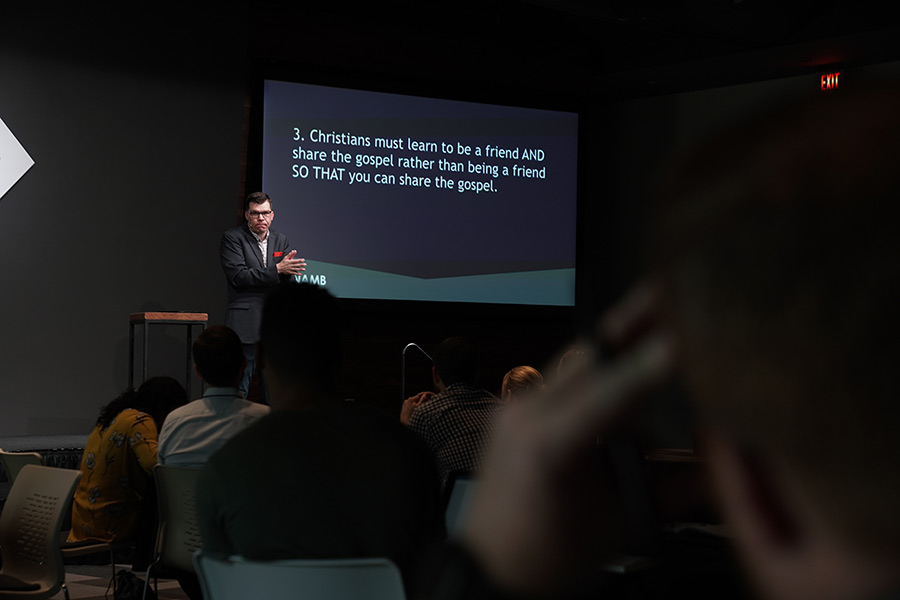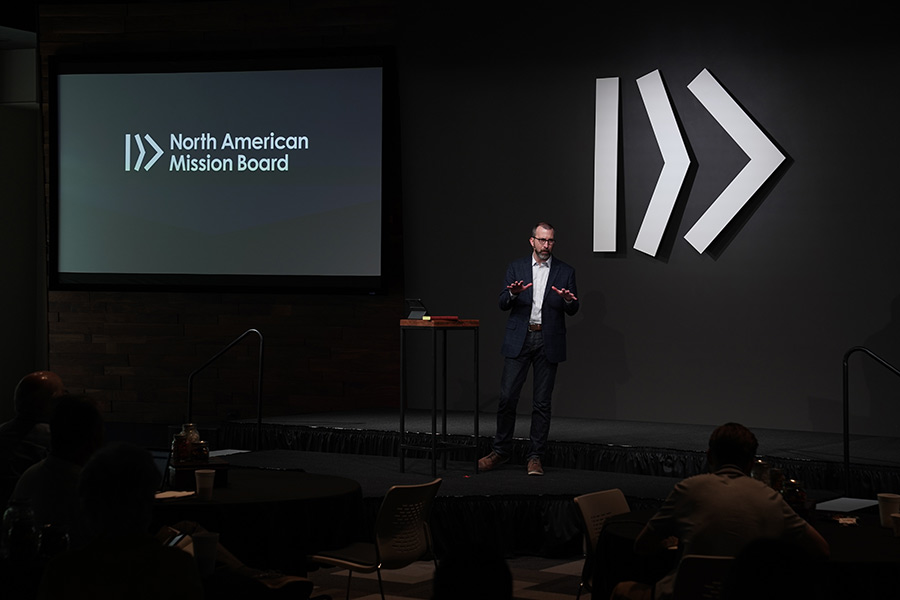By Brandon Elrod
(ALPHARETTA, Ga.)— By the year 2050, the Muslim population in North America is projected to double. That figure might trouble some in the United States, but Micah Fries, pastor of Brainerd Baptist Church in Chattanooga, Tenn., believes Christians have no reason to be concerned.
“If you ask the average American Christian to tell us what percentage of the U.S. is Muslim,” said Fries, “the vast majority give you a number from 10, 15, even 20 percent. The truth is, it’s one percent. Projections estimate it will grow to 2.1 percent by 2050.”

Micah Fries, pastor of Brainerd Baptist Church in Chattanooga, Tenn., emceed and spoke during an event about Islam and North America hosted at the North American Mission Board in Alpharetta, Ga., on Thursday, May 2. The event focused on equipping Christians to love and share their faith with their Muslim neighbors. NAMB photo by Micaiah Davis.
That statistic is one example of the misconceptions about Islam that tend to generate fear and confusion, preventing Christians from loving their Muslim neighbors well, said Fries.
The anxiety that regularly appears in the media spurred Fries and Keith Whitfield, associate professor of theology at Southeastern Baptist Theological Seminary (SEBTS), to compile a book called Islam and North America: Loving our Muslim Neighbors.
On Thursday (May 2nd), the North American Mission Board hosted an event based on Fries and Whitfield’s book. Nearly forty attended in person and roughly 300 individuals and locations joined by simulcast.
“Our desire is to create a conversation to help people see and become aware of an opportunity and encourage them to” seize the opportunity to reach their Muslim neighbors, Whitfield said ahead of the conference.
The event included speakers who contributed to the book: Kambiz Saghaey, director of Persian studies at SEBTS; Ed Stetzer, director of the Billy Graham Center at Wheaton College in Chicago; Bob Roberts, pastor of Northwood Church in Keller, Texas; Andy DeFelice, director of Moriah International; Bart Barber of First Baptist Church, Farmersville, Texas; along with Whitfield and Fries.
Topics ranged from the benefits of more multi-faith dialogue, clearing up misunderstandings about Islam, the need for religious liberty for all faiths and methods for sharing the gospel with Muslims.

Keith Whitfield, associate professor of theology at Southeastern Baptist Theological Seminary in Wake Forest, N.C., shared about the theological differences between Islam and Christianity during an event on Islam in North America hosted at the North American Mission Board. NAMB photo by Micaiah Davis.
Saghaey led off the event by sharing his testimony of converting from Islam to Christianity.
“I was born in Iran in a Muslim family in Shia Islam. In 1997, I moved to Cyprus for work…I was so zealous for my belief,” said Saghaey. In Cyprus, he came to faith in Christ after several months of interacting with Christians at an Iranian church and became a missionary to the Middle East.
Stetzer then shared about his experiences as a researcher and participant in interfaith dialogue that led him to rethink how interactions between people of different faiths take place.
“For years, many people of various faiths have promoted ‘interfaith dialogue’ in order to discover common ground and work together for humanity’s sake,” said Stetzer. “That sounds good, until we start digging below the surface.”
Stetzer and Roberts, in their respective talks, discussed the need for believers in different faiths to be honest about the distinctions.
“Pretending that we all believe the same thing does not foster dialogue but in fact prohibits it,” Stetzer said.
Both Stetzer and Roberts described how honesty and genuine love has opened doors to build relationships with Muslims around the world and opened doors to share the gospel.
Fries, who has led his church to reach out to the Muslim community in Chattanooga, has seen several Muslims come to Christ. He also emphasized that, though they rightly need to desire that they come to faith, Christians should not simply see the Muslim community as a project.
“We’re not doing this just because we want people to come to Christ. We value individuals whether they come to Jesus or not,” he said. “We want them to know that we value you as created in the image of God.”
Many of the attendees left inspired to interact with their Muslim neighbors without being afraid to share the gospel with them.
“What this [event] has been amazing at is taking a concern that we know we should all have in terms of engaging with our neighbors, starting to make some of that real but making sure that, in doing so, we keep our theology where it needs to be,” said David Tucker of ChristWay Church in Chattanooga.
Meredith Ringwalt traveled from Rome, Ga., with a group from Three Rivers Church to participate in the conference. She said that she has several Muslim neighbors where she lives, and the event encouraged her to be expectant when sharing God’s Word and to trust that His Spirit will do the work.
The North American Mission Board will share video from the conference once it becomes available.
Brandon Elrod writes for the North American Mission Board.
MASHALLTOWN, Iowa (BP) — Southern Baptist Disaster Relief teams have begun cleanup work in Marshalltown, Iowa, following a devastating tornado July 19.
A Missouri Baptist Disaster Relief team arrived Tuesday to set up incident command at Iglesia Karios in Marshalltown. Chainsaw teams from Iowa have dispersed throughout the city to clear debris. An SBDR feeding team has prepared meals for recovery workers in the area.
Additional SBDR volunteers from Kansas-Nebraska and Florida already are on the ground in Marshalltown. Carlson, co-director of Iowa Baptist Disaster Relief, expects volunteers from other nearby states to arrive later this week and early next week. Teams from other states interested in providing assistance should contact their state disaster relief director.
“It looks like a war zone to tell you the truth,” Carlson said. “When you go downtown, you’ll see a lot of glass and brick everywhere.
“On the east part of town, there are about 10 blocks that are very heavily hit. There’s really not many trees standing. A lot of those homes aren’t livable,” Carlson said.
The EF-3 tornado injured at least 235 people in the town of 27,000 located 50 miles northeast of Des Moines. Carlson estimates that at least 100 homes were destroyed. Many more homes will take substantial work before people can return to live in them. Carlson believes it will take months, if not years, for Marshalltown to rebuild.
Some of the worst damage in Marshalltown came to the town’s courthouse and the brick buildings in the town square. In recent years officials and property owners had slowly worked to revamp the buildings, many of which are now destroyed. Jenny Etter, executive director of the Marshalltown Central Business District, estimates that the city had spent $50 million in building renovations since 2002.
A dozen or more tornadoes hit central Iowa last Thursday, according to the National Weather Service. The two biggest tornadoes, both rated EF-3, hit Marshalltown and Pella, with peak winds of 144 mph.
SBDR chaplains are also in Marshalltown to provide support and counsel to residents impacted by the tornado. Sam Porter, the North American Mission Board’s executive director of Southern Baptist Disaster Relief, prays the SBDR response will provide volunteers opportunities to share the Gospel.
“[The] number one goal with disaster relief is to earn the right to share the Gospel,” Porter said. “We work with those impacted. We treat them with respect. We pray with them. When they ask the question, ‘What makes you do this for no charge?’ that’s when you’ve earned the right to share the Gospel.”
The Marshalltown tornado comes on the heels of the SBDR response to flooding in Des Moines, Iowa, where teams wrapped up work last week. Eight people came to faith last week during SBDR efforts in the capital city, Carlson said.
Porter and Carlson urge Southern Baptists to pray for Marshalltown and the rest of Central Iowa.
“Pray for all the people who live here,” Carlson said. “A lot of them lost their homes. They lost their cars. They lost their job. There is a lot of a need here.”
Tobin Perry is a writer for the North American Mission Board.,
Published May 3, 2019